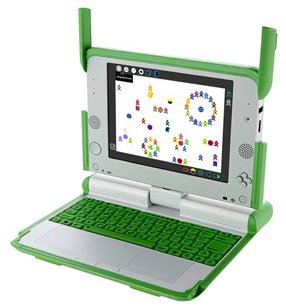OLPC switching to ARM, plans paper thin netbook
Nov 6, 2009 — by Eric Brown — from the LinuxDevices Archive — 17 viewsOne Laptop per Child chairman Nicholas Negroponte told Xconomy that OLPC is prepping an ARM-based version 1.75 of its XO netbook while planning to release a “paper-thin” version 3.0 in 2012. Meanwhile, the Internet Archive is providing OLPC users with 1.6 million e-books, says the nonprofit organization.
After a tough year of layoffs and sponsor defections, the non-profit OLPC organization, devoted to seeding its low-cost, Linux-ready XO netbooks around the world for schoolchildren in developing nations, received some good news two weeks ago. The Internet Archive announced it would make 1.6 million e-books available free to children with XO netbooks. The San Francisco based nonprofit has reformatted all 1.6 million of its e-books, mostly public-domain works that have outlived their copyright term, for optimal viewing on the XO.

OLPC's XO 1.5

This week, Xconomy's Wade Roush interviewed OLPC's founder and chairman Nicholas Negroponte, and discovered that OLPC is indeed moving forward on plans to develop a version of the XO based on an ARM processor. Negroponte had tipped the idea of an ARM-ready XO back in March.
At the time, Negroponte had suggested that the ARM chip might go in the planned XO-2, an early prototype of which (pictured above) had been demonstrated in September of last year. However, OLPC has now scrapped that ambitious, dual-screen design, Negroponte told Xconomy, and instead will release a version 1.75 next year that is based on the current design,= but switches to an undisclosed ARM-based processor.
XO-3 goes for e-reader design
Skipping over version 2.0, OLPC plans to ship a version 3.0 device in 2012. The XO-3 will be a "single sheet, completely plastic unbreakable, and waterproof," Negroponte was said to have told Xconomy. The quarter inch thick, e-reader-like device will include a color screen, "reflective and transmissive," and have no bezel or holes, according to Negroponte. Consuming a single Watt, the device is expected to sell for $75, which would finally break the $100 barrier OLPC has been striving for since the beginning.
In April of this year, OLPC announced an interim version 1.5 of the XO-1 that switched from a 500GHz AMD Geode LX800 to a faster, but still x86-based, 1GHz Via C7M processor. The 1.5 version also boosts memory to 1GB of DDR2 RAM, and provides 4GB or 8GB of flash, said the association.
In other OLPC-related news this year, Sugar Labs, OLPC's former Linux software arm, released a publicly available LiveUSB version of the "Sugar" Linux educational distribution, which runs on the XO. (Sugar Labs spun off with some acrimony as a separate entity not long after OLPC announced an agreement with Microsoft to develop a Windows version of the XO.)
When asked by Xconomy what he thought of Sugar Labs, Negroponte was said to have responded, "Sugar Labs is doing what we should have done in the first place, making [Sugar] an application, not an operating system."
Negroponte was also said to have reported that OLPC has so far shipped 1.1 million laptops, and currently has a backlog of 400,000 to 700,000. Even before the new Internet Archive donations, the organization has already made available over a million e-books for OLPC-toting kids in 31 countries.
According to Xconomy, Negroponte further said that Rwanda has been OLPC's learning hub since June, and that the group is now focusing on the rather challenging task of seeding the netbooks in Afghanistan and Northwestern Pakistan. He also noted that the partnership with the International Telecommunication Union (ITU) to help distribute the XO netbooks and provide wireless internet connectivity to XO users was still on, but had proceeded slowly.
Negroponte was quoted as saying, "People no longer question OLPC as a concept. It is accepted. There is only one question and everybody asks it. That is: how do we pay for it? Turns out that is not hard, because the total cost of ownership, including buying the laptop, maintaining it and connecting it, is $1 per week, per child. While that is high for the poorest nations, it is not outrageous. The issue is how to front the money."
Availability
OLPC did not say when the ARM-based version 1.75 of the XO would be available, but the e-reader-like version 3.0 is due in 2012. The Xconomy interview with Negroponte may be found here, while OLPC's website can be found here.
This article was originally published on LinuxDevices.com and has been donated to the open source community by QuinStreet Inc. Please visit LinuxToday.com for up-to-date news and articles about Linux and open source.